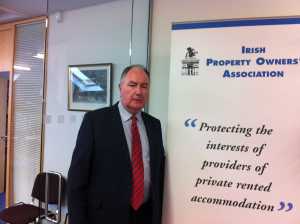
OWNERS of residential property leased out to tenants will be interested in attending a dedicated meeting to outline their interests vis-a-vis recent legislative changes.
The Irish Property Owners Association has about 5,500 members nationally and is running an information night in the Castletroy Park Hotel on Tuesday February 23 at 7.30pm.
IPOA chairman Stephen Faughnan will host the event, its agenda being to detail 2016 laws for landlords in running a property, and for tenants. He will also look at the standards required for private rental properties, with a particular focus on pre-1963 buildings. There will be an update on increased powers for the Private Rental Tenancies Board (PRTB); and a consideration of other forms of letting.
Local Authorities now have several schemes, some attached to tax advantage, others to long term security for owner and tenant. They were introduced to attract more units for their housing lists in this crisis time for accommodation.
Mr Faughnan will also look at tenants’ liability for water charges and how non-payment will impact. A Q&A session will close the evening.
“We will look at new legislation for the PRTB on the deposit collection and retention scheme,” the lobby chairman told Property page. “It’s expected to come into play in about 18 months – if it ever does. We have put up strong opposition to this move because of its heavily bureaucratic administration”.
He looks to the outcomes for the student population, vulnerable to the PRTB’s deposit retention scheme. Most students have their deposit paid for by parents. In the scheme, with both tenant(s) and the landlord having to sign for its return to the payee at the end of a leasing term, the release of monies will take more time. This could injure the student’s ability to secure a next property as the deposit and first month’s rent will have to be paid up front in a competitive market.
“And with respect to new standards, we do not condone bad standards by any means. Compliance with new standards is another issue, especially with pre-1963 buildings, many of which are multi-unit and protected because of their age. It is difficult to meet compliance as a lot of these houses are not suitable. We are looking for the bathroom to be designated, not integrated, as that is just not possible in a lot of cases.
“For such older multi-unit builds, the bathroom is often designated per unit but is located on the return of the stairs”.
Mr Faughnan cites the example of a series of nine beautiful properties on Dublin’s North Circular Road, each a multi-unit that is unable to meet the new standards.
“Houses such as these were used a lot by tenants at the lower end of the rental market who have had to move on and pay two to three times as much. But in fact it is the State that is paying for them,” be that for hotel accommodation or more expensive housing that meets requirement.
The IPOA is advocating an incentive scheme operated through Local Authorities with landlords to convert older and Georgian properties into suitable residential units again in a realistic, achievable way.







